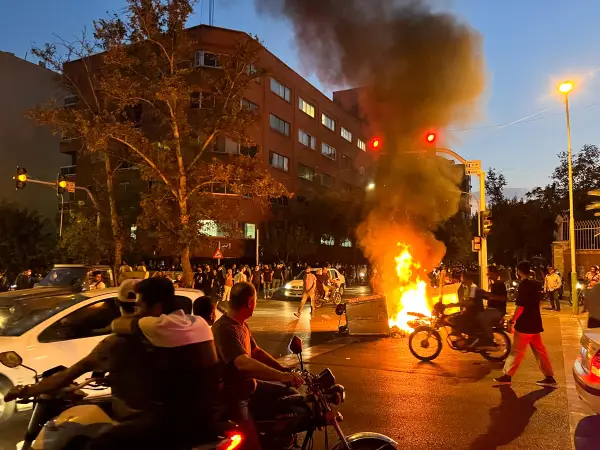While Iran suffers its worst social and economic unrest since the 1979 revolution, the Kayhan daily, linked to Iran's Supreme Leader, claimed Iran would resemble present-day Saudi Arabia under the Pahlavi monarchy rule.
"Those rejected by the people [the Pahlavi royals] claim that if the Pahlavi government had remained, Iran would have moved towards progress and development, but in the most optimistic scenario, we would have the situation of today's Saudi Arabia," wrote Kayhan.
However, Iranians have led the biggest uprising against the government since the founding of the Islamic Republic since the 2022 Women, Life, Freedom movement, which has been met with brutal suppression by the regime.
Surging executions have seen hundreds of dissidents killed and hundreds of peaceful protesters murdered as the regime struggles to quash dissent and discontent. In the upcoming elections, turnout is expected to reach less than 15 percent.
However, the bizarre comparisons with Saudi Arabia, which last year resumed diplomatic ties with Iran, could only be wished for by the regime which is crippled under international sanctions for its nuclear program, suppression of unrest and most recently, its support of Russia's war on Ukraine.
Over the past two decades, Saudi Arabia's GDP has surged from $200 billion to over $800 billion, fueled largely by robust oil revenues and strategic economic diversification efforts. The kingdom, with its vast petroleum reserves, remains a dominant force in global oil markets and actively pursues initiatives to expand its non-oil sectors and foster employment among its nationals.
Despite possessing considerable oil and gas resources, Iran's GDP has dwindled to under $250 billion, experiencing a significant decline from $480 billion in 2016. Iraq, despite internal challenges, has surpassed Iran's GDP, while even non-oil producing Turkey boasts a GDP surpassing Iran's by over $800 billion.
Iran's economy, characterized by statist policies, faces systemic inefficiencies and a lack of private-sector-led growth. In contrast, Saudi Arabia's concerted efforts towards economic diversification and investment in sectors beyond oil underscore a divergent trajectory from Iran's economic struggles.
The kingdom's strategic initiatives to bolster education, job training, and attract foreign investment stand in stark contrast to Iran's economic challenges, marked by inflation, unemployment, and a persistent brain drain.
A 2022 survey by Netherlands-based Gamaan institute found that 41 percent of respondents wanted the overthrow of the Islamic Republic, exiled prince Reza Pahlavi the most popular alternative to take over.
In contrast to the Kayhan commentary, the royal family is still viewed with fondness. Mohammad Reza Pahlavi, overthrown by the Islamic Revolution of 1979, was viewed positively by 64% of respondents.
